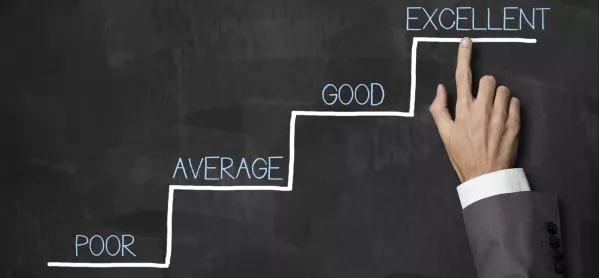Unless you’ve had your head well and truly buried in the sand for the last year or so, you will be fully aware of the Ofsted guidance that states, “Inspectors must not provide an overall grade for the lesson”.
To further emphasise their point, Ofsted followed this original guidance with a ‘myth-busters’ style document explaining that they ”[do] not grade individual lessons”.
When it first surfaced, this exciting nugget of information was swiftly shared all over social media, pinned onto staffroom noticeboards and verbalised by countless union reps all over the country.
No longer would inspectors define teachers by one single lesson in one single moment of time. No longer would performance be judged on a lesson witnessed out of context.
Surely - many teachers found themselves asking - surely, senior managers would follow suit and ditch the grading system they used, to match the system now being used by Ofsted?
Yet, as time went on, it became clear that many schools had decided not to do this; instead, they carried on as normal: providing feedback and a formal grading. It seems that the culture of mistrust that exists between Ofsted and schools ultimately means that some schools are too scared to follow the new guidelines.
Like asking Adele to grade Whitney Houston
My school, a local authority run secondary school, is one such school. Since being promoted to assistant head of English last September, I have found myself having to observe colleagues, some of whom trained alongside me on my PGCE, and some of whom have more than double the teaching experience that I have.
In my mind, it’s like asking Adele to grade Whitney Houston. Both are great artists - but one of them has a far lengthier, more established career under her belt.
Although I am fully aware that my qualifications and expertise more than qualify me to observe lessons and provide detailed feedback, I still have that moment of panic when it comes to attaching a grade to lessons.
Just last week, I observed a lesson that was ‘Good’ in all areas: the teacher’s subject knowledge of English was clearly very strong and the way in which they imparted it to their students was highly engaging.
Yet when it came to revealing the grade, I felt my pulse quicken and globules of sweat formed on my brow. There were many great things about the lesson, and two action points. So why should I have to differentiate whether it was ‘Good’ or ‘Outstanding’? Does the difference even matter?
A pointless exercise
To me, a teacher who is consistently ‘Good’ is an asset to our English department; we shouldn’t demoralise and dishearten our great teachers by frivolously, and needlessly, marking them with superficial numbers.
Let’s face it, there is a retention crisis looming and official statistics for the number of Initial Teacher Training places show a decrease in the number of applicants, so we need to hold onto the good ones.
First and foremost, I believe that observations should be used as a method of CPD (both for the observer and the teacher being observed) and from my own experience, I know that some teachers will worry unnecessarily over a superficial grading, rather than reflecting on what went well, or not so well, in their lesson.
But every time I’m asked to grade another teacher at the end of a lesson observation, I do wonder whether a formal grading can do more harm than good.
How long will we have to wait until Ofsted takes steps to overturn this culture of mistrust, and instead help schools to shrug off this burden altogether?
The writer teaches in a secondary school in the south of England




